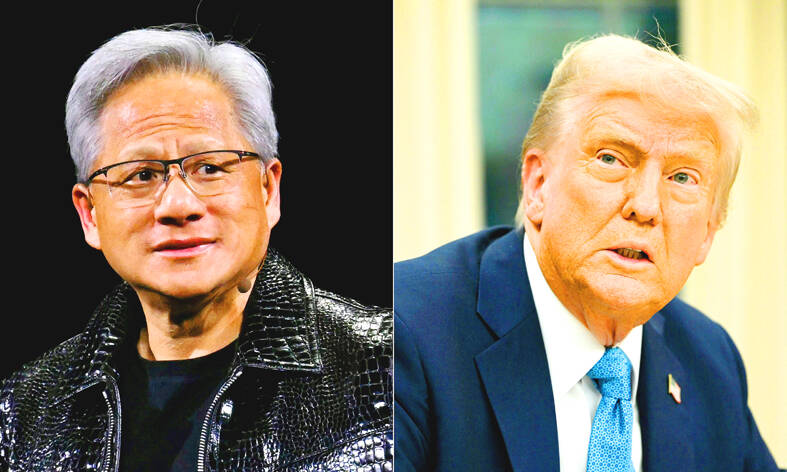Jensen Huang (黃仁勳), CEO of artificial intelligence (AI) chip giant Nvidia Corp, met on Friday with US President Donald Trump as the company suffered a rough week on Wall Street over competition with China and the threat of tariffs on semiconductors.
Trump said he would put tariffs on imports of computer chips to the US, which would punish Nvidia’s business that depends on imported components, mainly from Taiwan.
“It was a good meeting, but eventually we’re going to put tariffs on chips,” Trump told reporters afterward.

Photo: AFP
High-end versions of Nvidia’s chips face US export restrictions to the major market of China, part of Washington’s efforts to slow its Asian adversary’s advancement in the strategic technology.
That policy came under scrutiny this week when Chinese start-up DeepSeek achieved widespread adoption of its latest AI model that was developed without access to Nvidia’s export-blocked H100 chips.
After the DeepSeek breakthrough, US media reported the Trump administration was exploring ways to expand the restrictions to Nvidia’s lower-end chips.
The DeepSeek model triggered a plunge in Nvidia’s stock on Monday, wiping out nearly US$600 billion in market value — Wall Street’s largest single-day loss ever.
“We appreciated the opportunity to meet with President Trump and discuss semiconductors and AI policy,” an Nvidia spokesperson said. “Jensen and the president discussed the importance of strengthening US technology and AI leadership.”

SEEKING CLARITY: Washington should not adopt measures that create uncertainties for ‘existing semiconductor investments,’ TSMC said referring to its US$165 billion in the US Taiwan Semiconductor Manufacturing Co (TSMC, 台積電) told the US that any future tariffs on Taiwanese semiconductors could reduce demand for chips and derail its pledge to increase its investment in Arizona. “New import restrictions could jeopardize current US leadership in the competitive technology industry and create uncertainties for many committed semiconductor capital projects in the US, including TSMC Arizona’s significant investment plan in Phoenix,” the chipmaker wrote in a letter to the US Department of Commerce. TSMC issued the warning in response to a solicitation for comments by the department on a possible tariff on semiconductor imports by US President Donald Trump’s

‘FAILED EXPORT CONTROLS’: Jensen Huang said that Washington should maximize the speed of AI diffusion, because not doing so would give competitors an advantage Nvidia Corp cofounder and chief executive officer Jensen Huang (黃仁勳) yesterday criticized the US government’s restrictions on exports of artificial intelligence (AI) chips to China, saying that the policy was a failure and would only spur China to accelerate AI development. The export controls gave China the spirit, motivation and government support to accelerate AI development, Huang told reporters at the Computex trade show in Taipei. The competition in China is already intense, given its strong software capabilities, extensive technology ecosystems and work efficiency, he said. “All in all, the export controls were a failure. The facts would suggest it,” he said. “The US

The government has launched a three-pronged strategy to attract local and international talent, aiming to position Taiwan as a new global hub following Nvidia Corp’s announcement that it has chosen Taipei as the site of its Taiwan headquarters. Nvidia cofounder and CEO Jensen Huang (黃仁勳) on Monday last week announced during his keynote speech at the Computex trade show in Taipei that the Nvidia Constellation, the company’s planned Taiwan headquarters, would be located in the Beitou-Shilin Technology Park (北投士林科技園區) in Taipei. Huang’s decision to establish a base in Taiwan is “primarily due to Taiwan’s talent pool and its strength in the semiconductor

French President Emmanuel Macron has expressed gratitude to Hon Hai Precision Industry Co (鴻海精密) for its plan to invest approximately 250 million euros (US$278 million) in a joint venture in France focused on the semiconductor and space industries. On his official X account on Tuesday, Macron thanked Hon Hai, also known globally as Foxconn Technology Group (富士康科技集團), for its investment projects announced at Choose France, a flagship economic summit held on Monday to attract foreign investment. In the post, Macron included a GIF displaying the national flag of the Republic of China (Taiwan), as he did for other foreign investors, including China-based